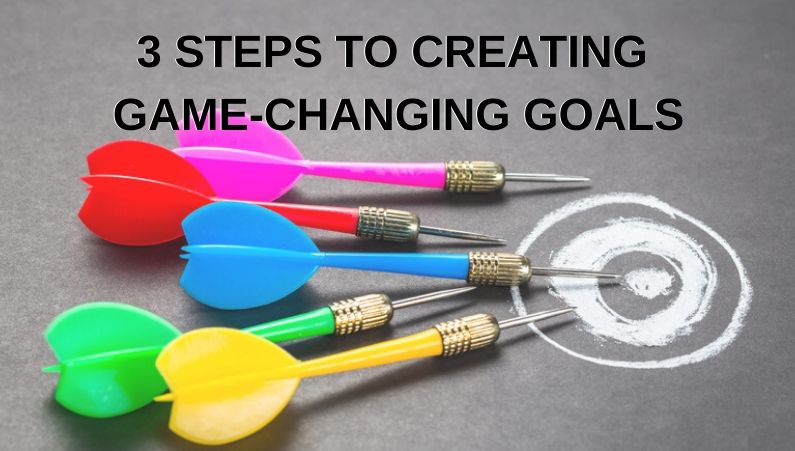
Whether you are just starting your business or you are looking to get ahead in life and improve your living, setting goals is a crucial part of your progress. You know what they say: “The only goals that are worth pursuing are the ones that grab hold of your passion.” So, whatever motivates you and keeps you on track is what you should be doing when working toward your dreams.
Psychologists, motivational speakers, and other professionals in the field of self-improvement all agree that setting goals makes people more productive and more proactive. Goals give you focus and your brain is always working on how to help you achieve your goal – particularly when you review your goals constantly. Have you ever woken up knowing the solution to a problem or gotten a brilliant idea in the shower? That’s your subconscious mind at work, helping you get to your goals.
Goals also keep you focused. Sometimes, my clients tell me they feel as if they are sleepwalking through life. They would like to start doing something that would make them feel alive, but with so many options around, they feel lost and don’t know where to start.
Robert Heinlein said it very well “In the absence of clearly-defined goals, we become strangely loyal to performing daily trivia, until we ultimately become enslaved by it.”
So which would you prefer? Would you rather be driven by your current habits, or start setting important goals – goals you can get emotionally involved in – and achieve something amazing?
But how do you set your goals? Where do you start? And how do you do it correctly? I’m sure you have a lot of questions and doubts at this point. That’s completely normal until you get started. Once you follow the steps below, there’s nothing that can stop you from confidently walking on your path to success.
Your goal-setting path to success
Goal setting is effective for every stage of your life (and your business). You can be starting a side business to create passive income, launching digital products, or simply finding out what you want from life at this point. Setting your goals and revising them regularly is a potent strategy that yields success every time.
Ready to change your life? Let’s get to the 3 key steps of setting your goals.
Don’t get hung up on perfection
I know I said that planning and preparation are key, and they are. But now that you have started preparing for your product, keep in mind that you are not striving for perfection. Let me say that again – you are NOT striving for perfection. You are striving for effective. If you misspell a word or don’t have your branding completely perfect, it’s okay. It’s okay to be human. If you worry about being perfect, your product may stay an idea forever, which is no good for you or your clients. All businesses start from humble beginnings and evolve as they grow. You will do the same thing.
Launch as soon as you find the need for it and be satisfied with the small victories in the beginning. By starting with an MVP – minimum viable product – you are able to present the main core of your version of the product to the world, you can test it on the market faster and evaluate the potential of the idea without investing a lot of capital.
Then, as you go, improve your digital products or services and watch your passive income grow, which brings us to the following method.
What do you want to achieve?
Your goal is what you want, what you REALLY want. Knowing what you want is crucial. And defining it requires time. I’m not talking here about “I want to earn 5% more than last year”. That’s not a game-changing goal. Think broader, think deeper. If you think about your business and where you want it to be, what do you really want? The objective is to create a goal that you can see and feel, so that you get really emotionally attached to it.
Start with your business goal. You probably have an income figure in mind. If you really want to stretch yourself, double it. But that is a topic for another post! Now that you have a figure in mind, write it down. Then write down what that means, how will that goal look once you’ve achieved it. Think about things like:
- Number of clients
- Hours you’ll work each day
- Days you’ll work each week
- Who are you perfect clients
- What will you be doing
- Who will be around supporting you (will you have a team?)
- How much money will you have in the bank
Next, you can look at the goal and break it down from the business perspective. If you look at the income goal, think about:
- How many people will you have at which price point?
- What are you selling?
- Why do they need it?
- Why are you excited about it?
- Why are you the perfect person to deliver it? How do you know?
These questions will help you break your goal down into manageable pieces and craft plans for achieving the goal.
Create this picture vividly in your head. Write it down. Read it often (at least twice a day). Better yet, record it and listen to it a few times a day. The idea is to become so immersed in this picture that you’ll feel like you are already living with this goal accomplished.

Know where you are
After you’ve written your goals, you’ll need to step back and check where you are in life and your business at the moment. This will help you determine what need to do to achieve your goals.
You cannot get where you are going without first understanding where you are.
Just think about using a map. You need two points to craft your path to a destination. Without your current location, you’ll wander aimlessly, with little chance of getting where you are going. But when you know where you are, you can easily find the best way forward.
In a business context, that means that if you have goals, but lack a clear understanding of your current status, it will be almost impossible to achieve the goals. And you will waste a lot of time and energy in the process. Who needs that frustration?
Knowing “where you are” covers a lot of ground. It can be related to skills, time, investment, state of your business and more.
Start with the numbers, they are easy. Don’t be afraid of your business metrics. If they aren’t where you want them, you still need to know what they are in order to go forward. Capture everything about your business:
- Number of clients
- Packages currently available with price points
- Revenue
- Profit
- Social media statistics (each account)
- Website statistics
- Email statistics
Next, think about the skills you may need to accomplish your objectives. Do you need to learn a specialized skill? How much time and money will you need to acquire this new skill? Are there are people in your circle that can help you? Should you outsource it instead of learning it yourself?
Now look at time. How much time do you estimate it will take you to achieve the goal? Do you have that time available? Does it fit in your concept of your life goals? If not, how can you change the time required? Will it cost money to get to the goal? Do you have the money available to invest? If not, it’s time to start thinking about how you’ll acquire that money.
Be absolutely candid with yourself. You don’t have to show this to anyone else if you don’t want to. Just be sure to capture an accurate picture of your current position, so that you are ready to take off once you set your goals.
Get clear on your WHY
Figuring out WHY you want what you want is a vital part of the goal-setting work. You can try to pursue a goal without doing this step, but chances are you won’t be motivated enough to stay on track for the long term. If you really want to achieve a goal, you need to connect to the emotion behind the goal. Give some thought to the “why” about achieving your goal, it will not only help you write your goals clearly and concisely, but it will give you the true reason to stick to them.
If you don’t start to feel emotionally connected to your goals at this point, try doing the 5 times why exercise. This will help you dig much deeper into the reason for a specific goal. For example, suppose I had a goal of doubling my income.
- Why? Because I want to buy a new house.
- Why? Because I want more space.
- Why? Because I want to be able to entertain more and have a bedroom for each of my kids and an office for myself.
- Why? Because I enjoy spending time with friends and family and I want the kids to be able to host their friends.
- Why? Because I want to provide a beautiful life for my family.
So the doubling of my income will be motivated by my desire to provide a better life for my family. It’s no longer about a number! And suddenly, I can see what doubling my income means in lifestyle terms.
A different way to amplify your motivation is create a list with all the benefits that come from achieving your goals. What are the good things that come from achieving your business goals? How much more financially free you would be? What is the lifestyle you could lead? Try writing 50 benefits to achieving your goals. Yes, 50. You’ll be amazed at how many amazing benefits there are to achieving your goals.
Your WHY is your ultimate source of motivation, and you should re-read them as often. As I mentioned earlier, your brain is always working on how to help you achieve your goals, particularly when you review them regularly. You should definitely re-read this list when you start to get a little demotivated or distracted on your work – reconnecting with your WHY will re-energize you and keep you moving forward.
So, now that you know how to set goals successfully, let’s talk about why goal-setting works.
The science behind goal setting
Setting your goals is key to success. But doing it right gives you an 80% higher success rate. Why is that?
Achieving your goals is all about taking action. Going back to the map analogy, you can study the map all you want, but if you don’t start moving, you’ll never get to your destination. Having goals helps you to continue to take action for 3 reasons:
- Goals energize your performance. Clearly set goals motivate you to match your efforts with the difficulty of the task.
- Goals make you persist over time. Persistence beats talent every time.
- Goals help you focus (or re-focus) on what matters while blocking negativity and irrelevant things that might potentially set you back in the achievement of the task
Goal setting is the first step on the road to success. It makes you plan ahead and builds your faith in your abilities. This is especially effective for people who tend to doubt their future success based on past outcomes.
It’s time to turn a new page and start following your dreams with clear and specific goals. It’s the ultimate path to changing your life for the better!

Recent Comments